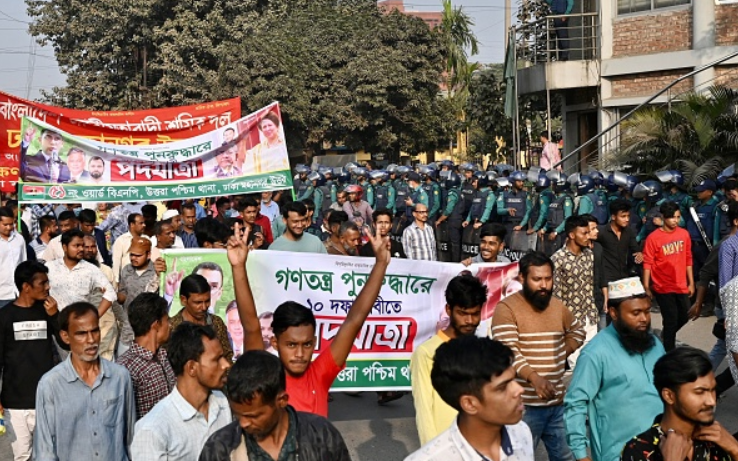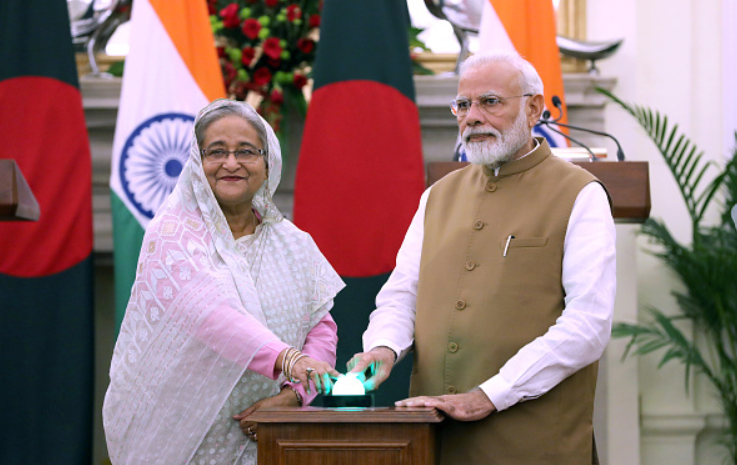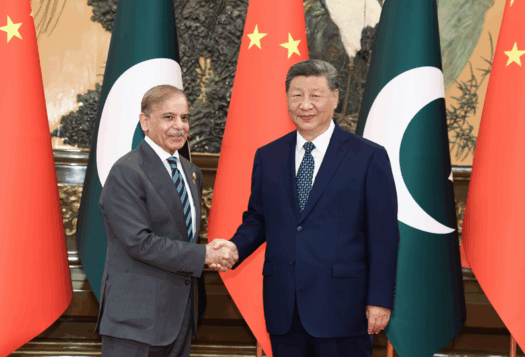
Large-scale protests have rocked Bangladesh’s major cities like Faridpur, Rajshahi, and Dhaka in recent months. Amid rising energy and fuel prices, Bangladeshis have mounted significant pressure on the current Awami-led government. National and international media outlets have attributed these protests to opposition forces led by the Bangladesh Nationalist Party (BNP) and Jamaat-e-Islami aiming to reassert their influence. Despite historic ties with the Awami League, the time is ripe for India to amend its approach to Bangladesh.
Since December, tens of thousands of protesters have taken to the streets to protest against the Awami League, which has led the country for over a decade. Recent protests have called for the removal of the Awami League party leader and sitting Prime Minister Sheikh Hasina. Hasina has responded with a heavy hand to her critics and members of the opposition. She has also refused to concede to opposition demands that include calls for free and fair elections under a caretaker government.
While New Delhi has yet to officially respond to protests, these political shifts do not augur well for India. Bangladesh is a diplomatic ally and shares a 2,545-mile-long border with India. In addition, Bangladesh is a central player in India’s ‘Neighborhood First Policy,’ which prioritizes enduring political and economic ties with immediate neighbors. However, while India and Bangladesh have enjoyed a golden era in ties over the past decade, New Delhi’s one-sided support of the Awami League has left it in an awkward position as protests rage on.
While India and Bangladesh have enjoyed a golden era in ties over the past decade, New Delhi’s one-sided support of the Awami League has left it in an awkward position as protests rage on.
On the one hand, India’s Bangladesh policy favors maintaining close relations with the Hasina-led Awami League without developing the same accord with Bangladesh’s other political parties. Since India’s relations with Bangladesh do not extend to opposition parties, Hasina’s leadership is central to a flourishing India-Bangladesh bilateral relationship. On the other hand, Bangladeshi opposition parties are now demonstrating an interest in engaging with India. While engaging with the opposition is sure to disrupt ties with the Awami League, rebalancing engagement could stabilize New Delhi’s influence in the country amid public backlash for its lopsided approach.
Looking ahead, India should extend full support to the Hasina government while also engaging with the opposition. In Bangladesh, India’s preference for the Awami League has proliferated anti-India sentiment on the streets, especially at a time when the ‘street’ has emerged as an ‘epithet’ to express political dissent. India must resolve existing bilateral issues with Bangladesh to ensure that its relationship will not remain hostage to party politics in Dhaka.
India and the Awami League
India has previously partnered with the Awami League government to increase its political influence in Bangladesh. Since the birth of Bangladesh in 1971, successive Indian governments have enjoyed robust ties with the Awami League due to India’s military and economic aid to the party and the Mukti Bahini. India’s former Prime Minister Indira Gandhi is widely respected by the Awami League members for her unconditional support of Bangladeshi independence.
For India, this fondness for the Awami League was born out of the principle of the “harmony of interest” that bound the left-wing elites of India and Bangladesh together. These elites, part of the political dispensation of the time – the Indian National Congress in India and the Awami League in Bangladesh – had similar political visions. For instance, both parties advocated ‘non-alignment,’ ‘peaceful coexistence,’ and ‘secularism’. Political bonhomie extended to culture with classical songs exalting the ‘shared motherliness of India and Bangladesh.’

Leveraging these developments, Indian political parties have built political ties with the Awami League over the years, often at the expense of other political parties in Bangladesh. In fact, despite initial attempts at political rapprochement, the Indian government has now eschewed engagement with diverse stakeholders in Bangladesh owing to their overt anti-India rhetoric. Under Modi, New Delhi has built a direct diplomatic relationship with Sheikh Hasina; this diplomatic alliance has emerged as the key pivot of the India-Bangladesh partnership.
Local Protests Threaten the India-Bangladesh Relationship
Historic ties between India and Hasina’s Awami League have ushered in a golden era in bilateral relations. Over the past decade, Bangladesh has agreed to several Indian demands, such as granting greater access to India’s North-East. Before the concession, Indian transport vehicles had to navigate through the narrow 13.7-mile stretch of land that connected mainland India with the North-East region. Connectivity with the Indian provinces of Assam, Meghalaya, and Tripura has improved with new access to transport routes via Bangladesh, boosting trade.
However, India has not made similar concessions for Bangladesh. For example, Indian security agencies have continued to detain and fatally wound Bangladeshi nationals along the India-Bangladesh border on suspicion of illegal migration and potential smuggling. Despite repeated requests by successive Bangladeshi governments to stop these extrajudicial killings, this long-standing issue between India and Bangladesh has remained unresolved and could emerge as a rallying point for the Bangladeshi opposition.
Unfortunately, the pandemic and the ongoing Russia-Ukraine war have resulted in economic hardship for Bangladesh at a time when space for dissent has reduced within the domestic public sphere. Hasina’s administration has approved laws governing social media and a preference for Indian investment, isolating the Bangladeshi populace. Furthermore, Hasina’s limited condemnation of Indian legislation, like the Citizenship Amendment Act (CAA) and the National Register for Citizens (NRC), has disgruntled local Bangladeshis and exacerbated fears of the possible forced migration of Indian-Bengali Muslims into Bangladesh. Similarly, her clear attempts at furthering Indian interests have facilitated India’s controversial legislation.
Many Bangladeshis feel alienated from their own government and view India as the entity shaping Bangladeshi policies. In such a precarious political environment, the deepening of the Modi-Hasina relationship has further contributed to feelings of collective alienation against their own state and India. In the same vein, due to India’s historical ties with the Awami League and the “anti-India rhetoric” spewing out of the Bangladeshi opposition, New Delhi has remained indifferent to establishing connections with Bangladesh’s opposition parties.
Moving Forward for India
The BNP is now trying to eschew its anti-India stance and wants to engage with India on key issues of concern for Bangladesh such as Teesta river water sharing agreements and ending border killings. In order to resolve these issues and further strengthen the India-Bangladesh partnership, India should forge relations with the BNP and its affiliates while maintaining its long-standing ties with the Awami League.
Except for a standalone visit by Modi to meet BNP leader Khaleda Zia in 2015, New Delhi has not reciprocated BNP interests in courting Indian diplomacy. Although the BNP has historically pushed an anti-India stance, further evaluation has revealed that this is mere pre-election posturing to win support among its local electoral support base in Bangladesh. Although the Awami League might express its discontent with an Indian decision to extend relations with its opposition parties, New Delhi should engage with the opposition at the highest levels and connect with the wider circle of Bangladeshi political players by meeting them at frequent intervals while encouraging their participation at different forums.
In order to resolve these issues and further strengthen the India-Bangladesh partnership, India should forge relations with the BNP and its affiliates while maintaining its long-standing ties with the Awami League.
Moreover, India must resolve critical bilateral issues with Bangladesh to further strengthen the bilateral relationship. For instance, India can address the Teesta River Water issue by engaging all stakeholders to win the confidence of the local Bangladeshi populace while formalizing water-sharing agreements for inter alia transboundary rivers, such as Ichamati, Manu, and Gomti through mechanisms like the Joint River Commission (JRC). New Delhi can also resolve the issue of extrajudicial killings of civilians along the shared border through joint patrolling and management of borders.
If India successfully resolves key bilateral issues, criticism from Bangladesh’s opposition parties over India’s lopsided relations with Dhaka will have less merit and be less susceptible to domestic political turmoil within Bangladesh. Engagement with the opposition parties will enable India to seek new partners in Bangladesh at a time when the party in power — the Awami League is losing popular support and does not have a potential successor.
***
Image 1: Munir Uz Zaman/AFP via Getty Images


